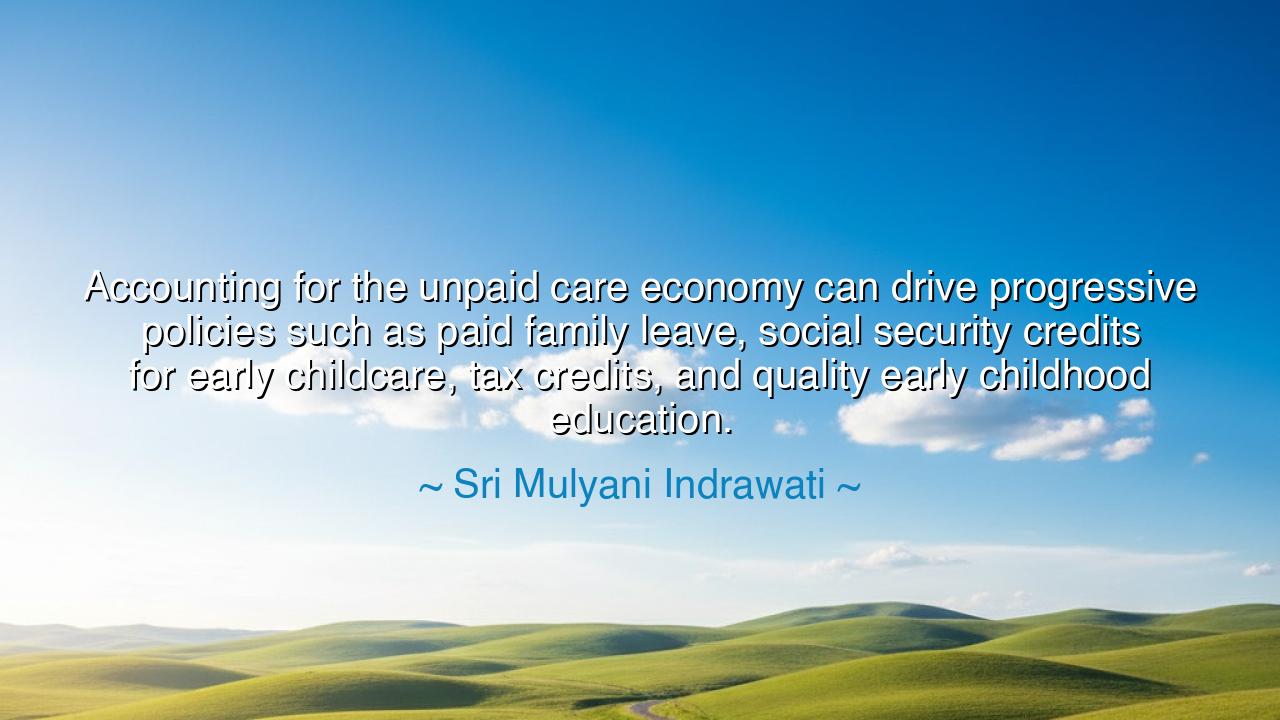
Accounting for the unpaid care economy can drive progressive
Accounting for the unpaid care economy can drive progressive policies such as paid family leave, social security credits for early childcare, tax credits, and quality early childhood education.






The words of Sri Mulyani Indrawati, an economist of deep vision and servant of justice, ring like a call from the heart of humanity itself: “Accounting for the unpaid care economy can drive progressive policies such as paid family leave, social security credits for early childcare, tax credits, and quality early childhood education.” Beneath these words lies a truth older than any law or market—that the labor of love, the work of mothers, fathers, and caregivers, though unseen by ledgers and ignored by budgets, is the foundation upon which all nations stand. Sri Mulyani reminds us that civilization is not only built by hands that earn, but by hands that nurture; and if we fail to honor that work, we build our future upon silence and sacrifice.
To understand the origin of her words, one must know the heart from which they arose. Sri Mulyani Indrawati, Indonesia’s former Minister of Finance and a leader in global development, has long stood among those who seek to reconcile economic progress with human dignity. In her role at the World Bank, she witnessed the invisible imbalance that burdens the world—how millions of women and caregivers labor without recognition, their time consumed by the quiet duties of raising children, tending to the sick, and sustaining the home. These tasks, though unpaid, form the hidden infrastructure of every economy. Her words arise, therefore, from both compassion and insight: that until we account for the unpaid care economy, our measures of wealth will remain incomplete, and our justice imperfect.
What is this unpaid care economy? It is the daily rhythm of human kindness—the meals prepared, the lessons taught, the tears wiped away. It is the work that never ends, that expects no wage but gives the world its continuity. Yet in most societies, this sacred labor falls disproportionately upon women, confining their potential and deepening inequality. Sri Mulyani’s wisdom reveals that to measure care is to value humanity itself. When nations begin to include this invisible work in their economic vision, they can craft policies that restore balance: paid family leave, that allows parents to love without penalty; social security credits, that reward years spent nurturing the next generation; tax credits, that ease the burden on those who give so much; and quality early education, that transforms care into collective strength.
History offers us lessons that echo her vision. In the mid-twentieth century, the Nordic nations—Sweden, Norway, Finland—recognized that social progress demanded the empowerment of caregivers. By investing in childcare, parental leave, and education, they did not weaken their economies—they strengthened them. The result was not decline, but prosperity; not dependency, but dignity. Their people flourished because they understood that a nation that values care values the very soul of its people. Sri Mulyani, speaking from an Eastern world still marked by gendered tradition, brings this wisdom to the global stage—calling for an awakening of both conscience and policy.
Her words carry also a moral weight beyond economics. For in truth, to ignore the unpaid care economy is to deny justice to those whose love sustains the world. It is to celebrate production while forgetting compassion; to reward profit while overlooking patience. The ancients taught that the greatness of a people is measured not by its wealth, but by its reverence for life. The caregiver, though unseen, is the living embodiment of that reverence. To uplift them is to honor the divine order that binds human hearts together. Thus, Sri Mulyani’s call is not merely an economic argument—it is a spiritual one: to restore balance between the visible and invisible labors of humankind.
Let her insight guide us toward action. Let policymakers count what was once uncounted. Let societies craft systems where care is not a burden but a shared duty, supported by law and culture alike. Let workplaces honor the rhythm of life, not as an obstacle to profit but as its true foundation. And let each of us, in our daily lives, remember to see the invisible labor around us—to thank, to support, to share in it. For when we measure love, we measure the truest wealth of all.
In the end, Sri Mulyani Indrawati’s words remind us that the future of progress depends not on machines or markets, but on the hearts that keep humanity alive. The unpaid care economy is the pulse of civilization—its silent music, its hidden strength. To account for it is to awaken justice; to honor it is to ensure that no generation builds its comfort upon another’s unseen toil. Let us, then, heed her wisdom and craft a world where compassion and policy walk hand in hand—where the hands that nurture are at last recognized as the hands that shape the destiny of nations.






AAdministratorAdministrator
Welcome, honored guests. Please leave a comment, we will respond soon